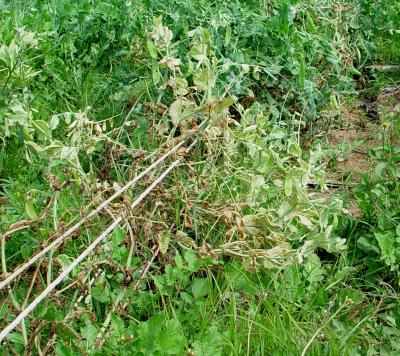Fusarium oxysporum f.sp. niveum
Credits:Biovision-Infonet

(c) A.M. Varela, icipe

(c) A.M. Varela, icipe
It causes root rot and corky decay of the stem near ground level, leading to wilting and death. Inside wilted stems the vascular tissue may be discoloured. White to pinkish fungus mycelium may grow over affected tissue. Leaves of affected plants turn yellow and eventually wilt and die. It also causes loss of young plants through damping-off, or of older plants through successive wilting. If fruit has formed, it remains small and loose commercial value.
Cucurbits are attacked at all stages of growth. When seedlings are invaded, they may damp-off and die. Older susceptible plants wilt initially, occasionally recover at night, but usually wilt quickly and die. In wet weather, a white or pinkish fungal growth develops on the surface of dead tissues. In advance stages of the disease, roots may decompose.
What to do:
- Raising and maintaining the soil pH to 6.0-7.0 by liming helps limit the disease.
- Practise crop rotation with non-related crops
- The plant stems need to be kept free of attack from insects whose bites are entry points for fungi and bacteria.
- The growing of cucurbits on plots where water stagnates, in overly damp or very heavy soil should be avoided, to help keep the plant collar dry.
- Excessive nitrogen fertilising is to be avoided. Sufficient application of calcium and potassium seems to reduce attacks
- The destruction of diseased plants and the elimination of plant debris reduce the inoculum in the soil.
- Deep tillage of the soil is necessary to bury crop residues so that they decompose completely.
- The nursery soil can be disinfected through solarisation or the application of damp heat (60 degC).
- Caution is needed to keep from contaminating disinfected plots with agricultural material or contaminated soil.
- The disinfection of tools (bleach) limits the propagation of the disease.
- Use of long rotation periods (3 to 4 years).